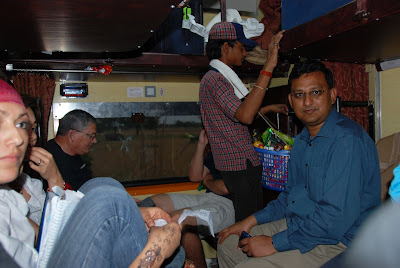Traveling within India by land especially for a foreigner could be tricky and full of surprises. Add to this when you're traveling in a group of eighteen with one-week worth of luggage and shopping. During the week, we've tried various forms of transportation like bus around Delhi, plane to Jaipur, tuk-tuk around the Pink City, elephant to get us up the Amber Fort, jeep on our way down from the fort, and a quick stint with the camel at the cultural fair, but nothing beats the train ride experience. Personally, I could say that you haven't really seen the real India unless you've taken interstate railway transport. On our 6th day in this incredible country our group traveled by rail to Agra to see the highlight of our tour - the amazing Taj Mahal, this marble mausoleum considered as one of the wonders of the world and the domed structure I had been dreaming to behold since third grade. But for me, surprisingly, it was the railway experience that served as the cherry on my sundae.


I'm a sucker for train rides and would get into a train whenever I get the chance. I've taken long train rides from Bangkok to Malaysia, London to Wales, Paris to Amsterdam; and short ones within Hong Kong, New York and Southern California. But the Jaipur to Agra train ride is so far the most eventful ever. It was not only pleasant but it was bad and ugly as well. And the chance to see the fusion of the good, the bad, and the ugly all in one setting is what makes the experience a real and authentic one, as this type of setting brings the worst and the best out of people. One may get a glimpse of the character of people in this interesting shared experience.

I've come to admire India more after this train ride adventure. Let me tell you why. First and foremost, you get to see different facets of Indian life as the train goes from one station to another passing through rice fields, small communities, city traffic, etc. Secondly, train stations and rail travel in India is synonymous to chaos. People and luggage are strewn everywhere and poverty is evident in the face of the masses hurdled at some stations. There are families with babies squatting on the pavement protective of their worldly possessions. There are old folks eating dinner, taking a nap, or simply waiting in silence. There are individuals stranded and staying the night out in the open air. But I didn't feel pity, but respect, for they have this sense of dignified bearing as they patiently wait for the train that will take them to their destination. They have this sense of peace in the chaos enveloping them. Porters shout amidst the loud noise of departing and incoming trains, but yet they hear each other. These manual laborers use every muscle and sinew to earn an honest income by carrying heavy luggage, but yet are uncomplaining. Hawkers and vendors are constantly in the look-out to sell their wares, tirelessly jumping in and out passing trains. Commuters in the economy cars are crowded against each other competing for precious space, but yet they could still spare a smile and wave to curious tourists in the platform. I admire this positive attitude of tenacity and cheerfulness regardless the situation one is in. It's hard to explain but after witnessing this, I've come to understand more how India thrives despite glaring paradoxes and see how is it possible to be peaceful amidst the chaos, to be cheerful despite discomfort, to be persevering in the face of abject poverty and hopelessness, to be hopeful despite the uncertainty.

A family with four small children traveling by rail along with their worldly possessions.
Travelers hurdled in the economy car waving at us from the other side of the tracks.
Pictured on the rights is the porter balancing my and Alfonso's red suitcases.
That's my backpack he's also carrying.
A hawker going from one train car to another selling Indian snacks.
Traveling with the group is another special experience on its own. I've come to know and appreciate my companions more, and the shared experience with them has made the trip even more eventful. We sang songs in our berth (both in English and various native tongues), took pictures, draw pictures (yes, Mayra could draw interesting-looking mustaches), made new friends, tried Indian snacks, teased each other and laughed at jokes, and exchanged stories. The view from the train window as the train rolled from one city to another also did not disappoint, especially after Robert hopped off in one station and wiped the glass clean. Good thing he made it back unscathed to rejoin in the merriment as the train rolled on to Agra. The five-hour train ride from Jaipur to Agra was one memorable experience I would surely hold onto for a long while.
Xinyan and Li posing by the window. Robert cleaning the glass during one of the
stops for a better view of the Indian countryside and other interesting things to see.
Having fun with old friends and new :) Meeting a USC student
from China traveling solo across India.

 Dr. Vipin sharing with us one of his hidden talents - singing while strumming a
stringed Indian instrument. Alfonso and Doris pretending to be funny pirates.
Mustache courtesy of Ms. Mayra Sigala :)
Dr. Vipin sharing with us one of his hidden talents - singing while strumming a
stringed Indian instrument. Alfonso and Doris pretending to be funny pirates.
Mustache courtesy of Ms. Mayra Sigala :)Alfonso and Dr. Vipin chatting over tea aboard a moving train.
Crowded in a single bunk but happy :)
Pre-departure look: Early afternoon photo while waiting for our train to arrive.
The scene that welcomed us upon arrival in Agra Station.























































